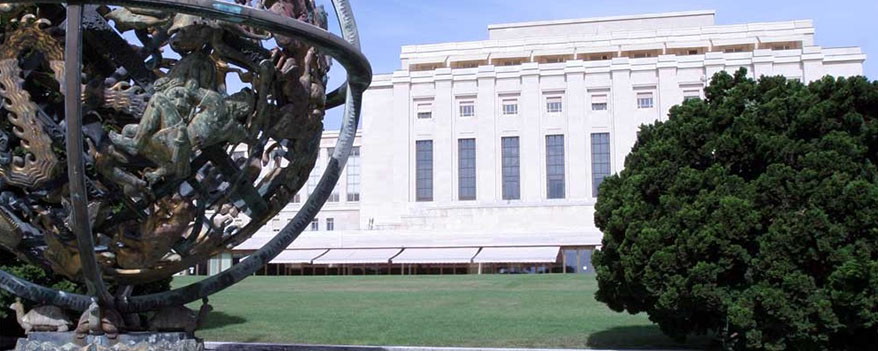Kofi Annan, former Secretary-General of the United Nations, kicked off the UN Open Ended Working Group on Taking Forward Multilateral Nuclear Disarmament Negotiations (OEWG) yesterday (Monday Feb 22) with a speech of encouragement and optimism. He lamented that nations, until now, have not focused sufficiently on nuclear disarmament.
Annan recalled his landmark speech to Princeton University a decade ago – in which he noted that “that we are not only “sleepwalking towards disaster”… In truth, we are asleep at the controls of a fast-moving aircraft. Unless we wake up and take control, the outcome is all too predictable.” The OEWG provides a possibility to take control of the plane and steer it to a nuclear-weapon-free world. Annan encouraged governments to use this opportunity to make progress on nuclear disarmament for the good of the planet and for future generations.
Taking stock – cautious optimism and appeal for constructive deliberations
The OEWG deliberations began with a session on ‘taking stock’ – an overview of the current situation regarding nuclear disarmament, including developments since the last OEWG in 2013 which was chaired by Costa Rica.
The session opened with presentations from Ambassador Ms. Elayne Whyte Gomez (Costa Rica) and Mr. Tim Caughley, Senior Researcher for the United Nations Institute for Disarmament Research (UNIDIR) which had produced a Briefing Paper on the OEWG: The Treatment of the Issue of Nuclear Disarmament since the Open-Ended Working Group in 2013.
In the subsequent exchange of views amongst governments and civil society, there were a number of strong appeals for progress and for taking into consideration the various views and positions of all governments (non-nuclear, umbrella countries and nuclear-weapon States). There was also cautious optimism that, despite a difficult political climate for nuclear disarmament, progress is possible.
Ambassador Patricia O’Brien from Ireland, for example, noted that ‘Diplomatic courage, persistence and determination can deliver results, even in the most challenging of circumstances. I speak here of the Joint Comprehensive Programme of Action with Iran, a tribute to the hard work and imagination of all concerned. I say imagination because no achievement can be reached unless it has first been imagined. No negotiation can be a success if those entering it do so in the expectation of failure.’
UNFOLD ZERO, in a message delivered to all delegates within an origami crane, noted that a nuclear-weapon-free world is a Common Good of the highest order (as highlighted by UN Secretary-General Ban-ki Moon) and expressing optimism for cooperation and success.
Legal measures and norms
The second session introduced the topic of the legal measures and norms required to achieve a nuclear-weapon-free world. It was opened with presentations from three experts and focus questions from the OEWG Chair:
- What are the essential elements that would comprise effective legal measures, provisions and norms for attaining and maintaining a world without nuclear weapons?
- What effective legal measures, provisions and norms in addition to those that currently exist need to be concluded to attain and maintain a world without nuclear weapons, and what are their respective advantages and disadvantages?
- What international legal architecture is needed and how could those new arrangements be applied in complementarity with existing legal measures and provisions? – would obligations under existing international instruments need to be harmonized or streamlined?
A background paper A Prohibition on Nuclear Weapons: A Guide to the Issues, was circulated by UNIDIR and the International Law and Policy Institute (ILPI) of Norway. The paper (and the panel) discussed various options of legal measures, such as a nuclear weapons convention or comprehensive ban treaty, a framework agreement, a building blocks approach and/or a prohibition on use (or threat and use) followed by negotiations on elimination.
The opening panel and the Chair’s focus questions helped to liberate many of the government’s interventions from the typical statements they make to other UN bodies reflecting opposing pre-set positions. Instead the session was a more free-flowing discussion of key issues and options.
Austria circulated working papers on The ‘legal gap and different approaches, and on Nuclear weapons and security – a humanitarian perspective. The government of Malaysia announced that they and Costa Rica would submit the Model Nuclear Weapons Convention to the OEWG to assist in deliberations on the elements for achieving a nuclear-weapon-free world. Australia announced that they would submit a working paper on the building blocks proposal.
Criteria for evaluating the proposed legal measures
Noting that there was not yet agreement on which legal measures or options should be negotiated, nor the sequencing of such negotiations, Switzerland suggested that there should be objective criteria for evaluating the various legal measures. Such evaluation could help the OEWG to reach agreement which of the proposals to prioritize and/or to choose. See Switzerland statement to to the OEWG on legal measures. These criteria could include:
- the scope and content of the instrument in question;
- the membership that would be required to make such an instrument effective;
- the value it adds to existing norms and instruments;
- the anticipated degree of universality that may be achieved;
- the point in time when a specific instrument may become opportune and realistic;
- the sequencing in the case more than one comprehensive instrument is contemplated;
- the interrelationship between several instruments, for instance in the case of a framework convention,
- the relation an instruments creates between NPT and non-NPT States
- the concrete and measurable contribution to risk reduction
- the verifiability of an instrument
- the potential an instrument has to facilitate further arrangements.
Deliberations will continue for the next two days on the legal measures and norms. Sessions later this week will focus on transparency, increasing awareness of the humanitarian impact of nuclear weapons, and measures to reduce the risks of nuclear weapons being used by accident, miscalculation or unauthorized actors.
To keep updated on the deliberations see OEWG official webpage, UNFOLD ZERO webpage on the OEWG and the Reaching Critical Will webpage on the February Session of the OEWG.

